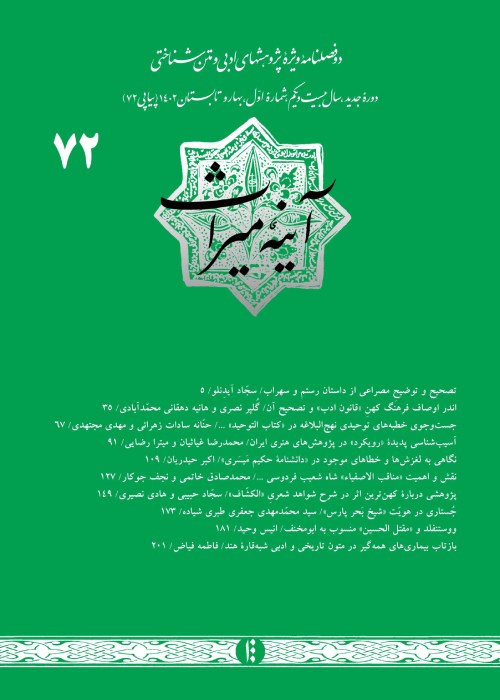Sad dar nasr and sad dar Boundahish and introducing its manuscripts
Author(s):
Abstract:
One of the literary genres of New Persian, which was used by the Zoroastrians in the Islamic era for translating myths, rites, rituals, and laws of the Zoroastrian religion from Avesta and Zand into Persian, is known as farsi-e Zardoshti (Zoroastrian Persian). This group of Persian texts is divided into two sub-groups: old and new. Examples of the old ones are texts referred to as Sad dar Nasr and Sad dar Boundahish. Sad dar nasr, which may be regarded the oldest Persian Zoroastrian text, is a text in Persian script, with Avestan and Pahlavi words and phrases representing Zoroastrians’ beliefs and edicts, whose date of compilation is said to go well before the year 864 of Yazdgird (late 15th and early 16th centuries). The Sad dar Boundahish is also a prose text in Persian and Avestan script allegedly dating back before the year 896 of Yazdgird. Semantically, syntactically and thematically the book is of certain importance. In the present article, these two important Persian Zoroastrian texts and their known manuscripts are introduced.
Language:
Persian
Published:
Mirror of Heritage, Volume:12 Issue: 3, 2014
Page:
239
magiran.com/p1422161
دانلود و مطالعه متن این مقاله با یکی از روشهای زیر امکان پذیر است:
اشتراک شخصی
با عضویت و پرداخت آنلاین حق اشتراک یکساله به مبلغ 1,390,000ريال میتوانید 70 عنوان مطلب دانلود کنید!
اشتراک سازمانی
به کتابخانه دانشگاه یا محل کار خود پیشنهاد کنید تا اشتراک سازمانی این پایگاه را برای دسترسی نامحدود همه کاربران به متن مطالب تهیه نمایند!
توجه!
- حق عضویت دریافتی صرف حمایت از نشریات عضو و نگهداری، تکمیل و توسعه مگیران میشود.
- پرداخت حق اشتراک و دانلود مقالات اجازه بازنشر آن در سایر رسانههای چاپی و دیجیتال را به کاربر نمیدهد.
In order to view content subscription is required
Personal subscription
Subscribe magiran.com for 70 € euros via PayPal and download 70 articles during a year.
Organization subscription
Please contact us to subscribe your university or library for unlimited access!


